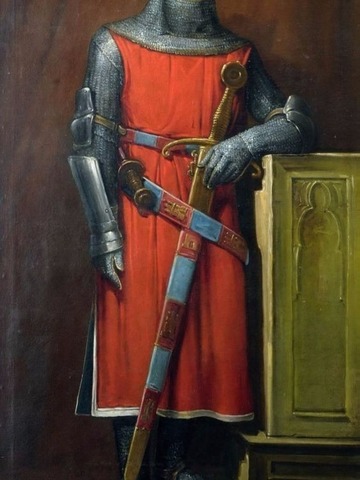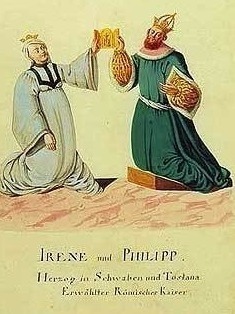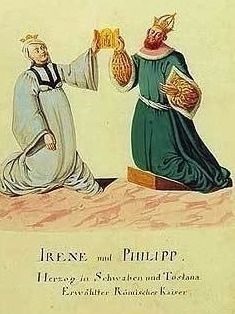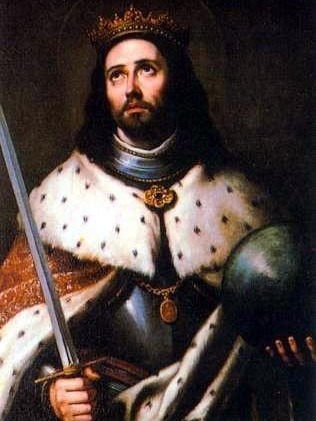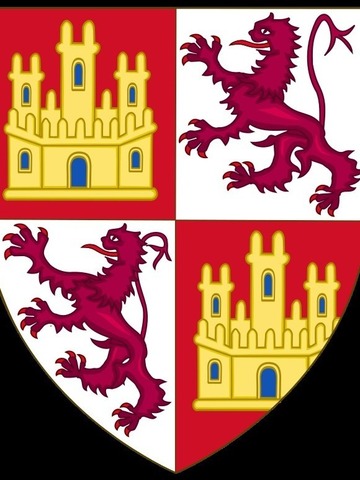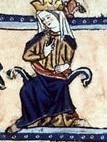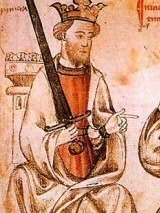Family Tree of Carlos Spartacus. » King Alfonso X ( Afonso Alphonso Alphonse or Alfons ) "The Wise" King of Castile León and Galicia (King Alfonso X ( Afonso, Alphonso, Alphonse, or Alfons ) "The Wise", King of Castile, León and Galicia) (1221-1284)
Personal data King Alfonso X ( Afonso Alphonso Alphonse or Alfons ) "The Wise" King of Castile León and Galicia (King Alfonso X ( Afonso, Alphonso, Alphonse, or Alfons ) "The Wise", King of Castile, León and Galicia)
- First name King Alfonso X ( Afonso, Alphonso, Alphonse, or Alfons ) "The Wise", King of Castile, León and Galicia.
- He was born on November 23, 1221.
- He died on April 4, 1284, he was 62 years old.
- A child of King Ferdinand III (Fernando) "the saint" King of Castile León and Galicia and Queen Elisabeth (Renamed Beatrice) "Elizabeth of Swabia" Queen of Castile León and Galicia House of Hohenstaufen
Household of King Alfonso X ( Afonso Alphonso Alphonse or Alfons ) "The Wise" King of Castile León and Galicia (King Alfonso X ( Afonso, Alphonso, Alphonse, or Alfons ) "The Wise", King of Castile, León and Galicia)
He has/had a relationship with Queen Volante / Violante Queen of Castile Infanta of Aragon (House of Barcelona) / Violante Queen of Castile Infanta of Aragon (House of Barcelona).
Child(ren):
Notes about King Alfonso X ( Afonso Alphonso Alphonse or Alfons ) "The Wise" King of Castile León and Galicia (King Alfonso X ( Afonso, Alphonso, Alphonse, or Alfons ) "The Wise", King of Castile, León and Galicia)
Complete bio here: https://en.wikipedia.org/wiki/Alfonso_X_of_Castile
The system don't let me past it here is too extense.
Civil war[edit]
Throughout his reign, Alfonso contended with the nobles, particularly the families of Nuño González de Lara, Diego López de Haro and Esteban Fernández de Castro, all of whom were formidable soldiers and instrumental in maintaining Castile's military strength in frontier territories. According to some scholars, Alfonso lacked the singleness of purpose required by a ruler who would devote himself to organization, and also the combination of firmness with temper needed for dealing with his nobles.[2] Others have argued that his efforts were too singularly focused on the diplomatic and financial arrangements surrounding his bid to become Holy Roman Emperor.
Alfonso's eldest son, Ferdinand, died in 1275 at the Battle of Écija against the Moroccan and Granadan invasion armies, leaving two infant sons. Alfonso's second son, Sancho, claimed to be the new heir, in preference to the children of Ferdinand de la Cerda, basing his claim on an old Castilian custom, that of proximity of blood and agnatic seniority. Alfonso preferred to leave the throne to his grandsons, but Sancho had the support of the nobility. A bitter civil war broke out resulting in Alfonso's being forced in 1282 to accept Sancho as his heir instead of his young grandsons; only the cities of Seville, Murcia and Badajoz remained faithful to him. Son and nobles alike supported the Moors when he tried to unite the nation in a crusade; and when he allied himself with Abu Yusuf Yakub, the ruling Marinid Sultan of Morocco, they denounced him as an enemy of the faith. A reaction in his favor was beginning in his later days, but he died defeated and deserted at Seville in 1284, leaving a will, by which he endeavored to exclude Sancho, and a heritage of civil war.
Economic policy[edit]
In 1273, he created the Mesta, an association of some 3,000 petty and great sheep holders in Castile, in reaction to less wool being exported from the traditional sites in England.[3] This organization later became exceedingly powerful in the country (as wool became Castile's first major exportable commodity[3] and reported a trade surplus, called "white gold", as the wool amount was critical to the health of the population during the winter), and eventually its privileges were to prove a deadly wound in the Castilian economy.[citation needed] One side effect of the quickly expanding sheep herds was the decimation to the Castilian farmland through which the sheep grazed. [3]
The original function of the Mesta was to separate the fields from the sheep-ways linking grazing areas.
Legislative activity[edit]
As a ruler, Alfonso showed legislative capacity, and a wish to provide the kingdoms expanded under his father with a code of laws and a consistent judicial system. The Fuero Real was undoubtedly his work. He began medieval Europe's most comprehensive code of law, the Siete Partidas, which, however, thwarted by the nobility of Castile, was only promulgated by his great-grandson. Because of this, and because the Partidas remain fundamental law in the American Southwest[citation needed], he is one of the 23 lawmakers depicted in the House of Representatives chamber of the United States Capitol.
Military training[edit]
Alfonso X of Castile
From a young age Alfonso X showed an interest in military life and chivalry. In 1231 Alfonso traveled with Pérez de Castron on a military campaign in lower Andalusia. Writing in Estoria de España, Alfonso describes having seen St. James on a white horse with a white banner and a legion of knights fighting a war above the soldiers of Spain.[4] This vision of a heavenly army fighting in Jerez and participation in military campaigns likely left Alfonso X with a high degree of knowledge and respect for military operations and chivalric knights. Alfonso's respect for chivalry can also be seen in his writing of Spanish law. Spanish Chivalric conduct was codified in the Siete Partidas (2,21) where he wrote that knights should be, "of good linage and distinguished by gentility, wisdom, understanding, loyalty, courage, moderation, justice, prowess, and the practical knowledge necessary to assess the quality of horse and arms (Siete Partidas, 21,1-10)."[5] These efforts to make a codified standard of chivalric conduct were likely meant to both encourage strength of arms (prowess) and to restrain the use of violence for only just (state-sponsored) usage.
Court culture[edit]
Main article: Literature of Alfonso X
King Alfonso X developed a court culture that encouraged cosmopolitan learning. Alfonso had many works previously written in Arabic and Latin translated into vernacular Castilian in his court. Alfonso "turned to the vernacular for the kind of intellectual commitments that formerly were inconceivable outside Latin."[6] He is credited with encouraging the extensive written use of the Castilian language instead of Latin as the language used in courts, churches, and in books and official documents (although his father, Ferdinand III, had begun to use it for some documents). This translation of Arabic and Classic documents into vernacular encouraged the development of Spanish sciences, literature, and philosophy.
Alfonso X (also occasionally Alphonso, Alphonse, or Alfons, 23 November 1221 – 4 April 1284), called the Wise (Spanish: el Sabio), was the King of Castile, León and Galicia from 30 May 1252 until his death. During the Imperial election of 1257, a dissident faction chose him to be King of the Romans (Latin: Rex Romanorum; German: Römisch-deutscher König) on 1 April. He renounced his imperial claim in 1275, and in creating an alliance with England in 1254, his claim on Gascony as well.
Alfonso X fostered the development of a cosmopolitan court that encouraged learning. Jews, Muslims, and Christians had prominent roles in his court. As a result of his encouraging the translation of works from Arabic and Latin into the vernacular of Castile, many intellectual changes took place, perhaps the most notable being encouragement of the use of Castilian as a primary language of higher learning, science, and law. Alfonso was a prolific author of Galician poetry, such as the Cantigas de Santa Maria, which are equally notable for their musical notation as for their literary merit. Alfonso's scientific interests—he is sometimes nicknamed the Astrologer (el Astrólogo)—led him to sponsor the creation of the Alfonsine tables, and the Alphonsus crater on the moon is named after him. As a legislator he introduced the first vernacular law code in Spain, the Siete Partidas. He created the Mesta, an association of sheep farmers in the central plain, but debased the coinage to finance his claim to the German crown. He fought a successful war with Portugal, but a less successful one with Granada. The end of his reign was marred by a civil war with his eldest surviving son, the future Sancho IV, which continued after his death.
Contents [hide]
1Life
1.1Early life
1.2Reign
1.2.1Imperial election
1.2.2Civil war
1.2.3Economic policy
1.2.4Legislative activity
1.2.5Military training
2Court culture
2.1Translations
2.2Astronomy
2.3Chronicles
2.4Historical writing
2.5Games
2.6Music
3Family
4Ancestors
5Notes
5.1References
6Further reading
7External links
Life[edit]
Early life[edit]
Alfonso X as a judge, from his Libro de los Dados,[1] completed ca. 1280.
Born in Toledo, Kingdom of Castile, Alfonso was the eldest son of Ferdinand III of Castile and Elizabeth (Beatrice) of Swabia. His mother was the paternal cousin of Holy Roman Emperor Frederick II, to whom Alfonso is often compared. His maternal grandparents were Philip of Swabia and Irene Angelina. Little is known about his upbringing, but he was most likely raised in Toledo. For the first nine years of his life Alfonso was only heir to Castile until his paternal grandfather king Alfonso IX of Leon died and his father united the kingdoms of Castile and Leon. He began his career as a soldier, under the command of his father, when he was only sixteen years old.
After the election of Theobald I as king of Navarre, his father tried to arrange a marriage for Alfonso with Theobald's daughter, Blanche of Navarre, but the move was unsuccessful. At the same time, he had a romantic relationship with Mayor Guillén de Guzmán, who bore him a daughter, Beatrice. In 1240, he married Mayor Guillén de Guzmán, but the marriage was later annulled and their issue declared illegitimate. In the same period (1240–1250) he conquered several Muslim strongholds in Al-Andalus alongside his father, such as Murcia, Alicante and Cadiz.
In 1249, Alfonso married Violante of Aragon, the daughter of King James I of Aragon and Yolande of Hungary, although betrothed already in 1246.
Reign[edit]
Alfonso succeeded his father as King of Castile and León in 1252. The following year he invaded Portugal, capturing the region of the Algarve. King Afonso III of Portugal had to surrender, but he gained an agreement by which, after he consented to marry Alfonso X's daughter Beatrice of Castile, the land would be returned to their heirs. In 1261 he captured Jerez. In 1263 he returned Algarve to the King of Portugal and signed the Treaty of Badajoz (1267).
In 1254 Alfonso X signed a treaty of alliance with the King of England and Duke of Aquitaine, Henry III, supporting him in the war against Louis IX of France. In the same year Alfonso's half sister, Eleanor of Castile, married Henry's heir to the throne, Edward: with this act Alfonso renounced forever all claim to the Duchy of Gascony, to which Castile had been a pretender since the marriage of Alfonso VIII of Castile with Eleanor of England.
Imperial election[edit]
In 1256, at the death of William II of Holland, Alfonso's descent from the Hohenstaufen through his mother, a daughter of the emperor Philip of Swabia, gave him a claim through the Swabian line. Alfonso's election as King of the Romans by the imperial prince-electors misled him into complicated schemes that involved excessive expense but never succeeded. Alfonso never even traveled to Germany, and his alliance with the Italian Ghibelline lord Ezzelino IV da Romano deprived him of the initial support of Pope Alexander IV. His rival, Richard of Cornwall, went to Germany and was crowned in 1257 at Aachen.
To obtain money, Alfonso debased the coinage and then endeavored to prevent a rise in prices by an arbitrary tariff. The little trade of his dominions was ruined, and the burghers and peasants were deeply offended. His nobles, whom he tried to cow by sporadic acts of violence, rebelled against him in 1272. Reconciliation was bought by Alfonso's son Ferdinand in 1273.
In the end, after Richard's death, the German princes elected Rudolph I of Habsburg (1273), Alfonso being declared deposed by Pope Gregory X. In 1275 Alfonso tried to meet with his imperial vicar in Italy, William VII of Montferrat (who had succeeded Ezzelino) and his Ghibelline allies in Piedmont and Lombardy to celebrate the victory against the Guelph Charles I of Anjou and be crowned in Lombardy; he was however halted in his imperial ambitions in Provence by the Pope who, after a long negotiation, obtained Alfonso's oral renunciation of the title of King of the Romans.
Timeline King Alfonso X ( Afonso Alphonso Alphonse or Alfons ) "The Wise" King of Castile León and Galicia (King Alfonso X ( Afonso, Alphonso, Alphonse, or Alfons ) "The Wise", King of Castile, León and Galicia)
 grandparents
grandparents
 parents
parents
 brothers/sisters
brothers/sisters
 children
children
Image(s) King Alfonso X ( Afonso Alphonso Alphonse or Alfons ) "The Wise" King of Castile León and Galicia (King Alfonso X ( Afonso, Alphonso, Alphonse, or Alfons ) "The Wise", King of Castile, León and Galicia)
Ancestors (and descendant) of King Alfonso X ( Afonso Alphonso Alphonse or Alfons ) "The Wise" King of Castile León and Galicia
King Alfonso X ( Afonso Alphonso Alphonse or Alfons ) "The Wise" King of Castile León and Galicia 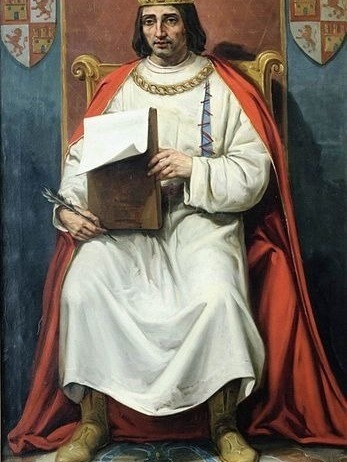 | ||||||||||||||||||||||||||||||||||
Relationship King Alfonso X ( Afonso Alphonso Alphonse or Alfons ) "The Wise" King of Castile León and Galicia (King Alfonso X ( Afonso, Alphonso, Alphonse, or Alfons ) "The Wise", King of Castile, León and Galicia)
- King Alfonso X ( Afonso Alphonso Alphonse or Alfons ) "The Wise" King of Castile León and Galicia is the 14th great grandson of Emperor Charlemagne "the great" Charles the Great Charles I King of the Franks (768+) King of the Lombards (774+) Emperor of the Romans (800/814) /814):Emperor Charlemagne "the great" Charles the Great Charles I King of the Franks (768+) King of the Lombards (774+) Emperor of the Romans (800/814) /814)King Pippin Carloman King Of Italy of ItalyKing Bernard. King of Italy (Carolingean House)Count Seigneur Pépin de Peronne Count of Peronne and St. Quentin in the Vermandois (Carolingean House)Count Herbert / Heribert I Count of Senlis and Vermandois (Carolingean House)Queen Béatrice of Vermandois (Carolingian House) Queen Consort of Western Francia De'Vermandois (Queen of Western Francia)Duke Hughes "the Great" Duke of the Franks and Count of Paris.(House Capet) capetKing Hugh / Hugo Capet King of France (House Capet) CapetKing Robert II "the Pious" King of Franks CapetDuke Robert I 'the old' / "Tete-Hardi" Duke of Bourgogne / Burgundy (House Capet) Bourgogne (Capet)Constance de BourgogneUrraca (Hourse Jimenez) "The Reckless", Queen Regnant of León, Castile, and GaliciaKing Alfonso VII Alfonso Raimúndez "the Emperor" King of Galicia(1111+) King of León and Castile (+1126). Emperor of all Spain, House of IvreaKing Ferdinand II King of León and GaliciaKing Alfonso IX "The Slobberer" King of León & Galicia (House Anscarid)King Ferdinand III (Fernando) "the saint" King of Castile León and GaliciaKing Alfonso X ( Afonso Alphonso Alphonse or Alfons ) "The Wise" King of Castile León and Galicia
- King Alfonso X ( Afonso Alphonso Alphonse or Alfons ) "The Wise" King of Castile León and Galicia is the 7th great grandson of King Hugh / Hugo Capet King of France (House Capet) Capet:King Hugh / Hugo Capet King of France (House Capet) CapetKing Robert II "the Pious" King of Franks CapetDuke Robert I 'the old' / "Tete-Hardi" Duke of Bourgogne / Burgundy (House Capet) Bourgogne (Capet)Constance de BourgogneUrraca (Hourse Jimenez) "The Reckless", Queen Regnant of León, Castile, and GaliciaKing Alfonso VII Alfonso Raimúndez "the Emperor" King of Galicia(1111+) King of León and Castile (+1126). Emperor of all Spain, House of IvreaKing Ferdinand II King of León and GaliciaKing Alfonso IX "The Slobberer" King of León & Galicia (House Anscarid)King Ferdinand III (Fernando) "the saint" King of Castile León and GaliciaKing Alfonso X ( Afonso Alphonso Alphonse or Alfons ) "The Wise" King of Castile León and Galicia
- King Alfonso X ( Afonso Alphonso Alphonse or Alfons ) "The Wise" King of Castile León and Galicia is the 20th great grandson of King Ceolwald King of Wessex of Wessex:King Ceolwald King of Wessex of WessexCoenred of Wessex (Wessex)Ingild of Wessex (Wessex)Eoppa King of Wessex of WessexEafa King of Wessex of WessexKing EALHMUND King of Wessex of Kent (Wessex)Egbert King of Wessex (802-839) ( Ecgberht / Ecgbert / Ecgbriht ) of WessexAethelwulf King of Wessex (839-858) King of WessexAlfred The Great King of Wessex (871-899) of WessexKing Edward "The Elder",King of the Anglo-Saxons (899-924) King of the Anglo-SaxonsKing Edmund I King of England (939-946),"the Deed-doer" the "Just" or "the Magnificent" of EnglandKing Edgar the Peaceful King of England of EnglandKing Ethelred II "'the Unready' King of England (978 – 1013) and (1014-1016) of EnglandKing Edmund II 'Ironside' King of England (1016) AthelingEdward 'Edward the Exile' AthelingMargaret CeannmoreEadgith Edith of ScotlandMatilda (Maud) "Holy Roman Empress Lady of the English" de Anjou, of NormandieHenry (Henry II) "King of England Curtmantle FitzEmpress" House of PlantagenetEleanor of england of Castile daughter of Eleanor of Aquitaine House of PlantagenetBerengaria Queen Regnant Castile & Queen Consort Infanta of Castile de CastillaKing Ferdinand III (Fernando) "the saint" King of Castile León and GaliciaKing Alfonso X ( Afonso Alphonso Alphonse or Alfons ) "The Wise" King of Castile León and Galicia
- King Alfonso X ( Afonso Alphonso Alphonse or Alfons ) "The Wise" King of Castile León and Galicia is the 9th great grandson of Duke Rolf (Rollo) "The Ganger" 1st Duke of Normandy /Hrólfsdóttir Ragnvaldsson:Duke Rolf (Rollo) "The Ganger" 1st Duke of Normandy /Hrólfsdóttir RagnvaldssonGeirlaug (Gerloc) Hrólfsdóttir (from Normandy) HrólfsdóttirAdelais de AquitaineKing Robert II "the Pious" King of Franks CapetDuke Robert I 'the old' / "Tete-Hardi" Duke of Bourgogne / Burgundy (House Capet) Bourgogne (Capet)Constance de BourgogneUrraca (Hourse Jimenez) "The Reckless", Queen Regnant of León, Castile, and GaliciaKing Alfonso VII Alfonso Raimúndez "the Emperor" King of Galicia(1111+) King of León and Castile (+1126). Emperor of all Spain, House of IvreaKing Ferdinand II King of León and GaliciaKing Alfonso IX "The Slobberer" King of León & Galicia (House Anscarid)King Ferdinand III (Fernando) "the saint" King of Castile León and GaliciaKing Alfonso X ( Afonso Alphonso Alphonse or Alfons ) "The Wise" King of Castile León and Galicia
- King Alfonso X ( Afonso Alphonso Alphonse or Alfons ) "The Wise" King of Castile León and Galicia is the 13th great grandson of Gregor (Kenneth I) "Giric Cináed mac Ailpín King of Picts of Scotland (MacAlpin):Gregor (Kenneth I) "Giric Cináed mac Ailpín King of Picts of Scotland (MacAlpin)King Constantine "Causantin mac Cináeda" King of Picts of Scotland (MacAlpin)King Domnall mac Causantín (Donald II) King of Picts "Domnall the Madman of Scotland (MacAlpin)King Malcolm "Mael Coluim King of Alba" of Scotland (MacAlpin)King Kenneth mac Máel Coluim (Kenneth II) "Cináed King of Alba" of Scotland (MacAlpin)King Malcolm II Mael Coluim King of Scotland "The Destroyer" Canmore House of Alpin aka Clann Chinaeda meic Ailpín Kings of the Picts of Scotland (MacAlpin)Bethóc of ScotlandKing Duncan I "Donnchad mac Crínáin King of Strathclyde King of the Scots" of Scotland (Dunkeld)King Malcolm III "Canmore Ceannmore King of the Scots King of Cumbrians Maol Chaluim mac Dhonnchaidh" of Scotland formerly Dunkeld aka MacDuff Ceannmore (Dunkeld)Eadgith Edith of ScotlandMatilda (Maud) "Holy Roman Empress Lady of the English" de Anjou, of NormandieHenry (Henry II) "King of England Curtmantle FitzEmpress" House of PlantagenetEleanor of england of Castile daughter of Eleanor of Aquitaine House of PlantagenetBerengaria Queen Regnant Castile & Queen Consort Infanta of Castile de CastillaKing Ferdinand III (Fernando) "the saint" King of Castile León and GaliciaKing Alfonso X ( Afonso Alphonso Alphonse or Alfons ) "The Wise" King of Castile León and Galicia
The data shown has no sources.
Historical events
Birthday November 23, 1221
- Graaf Willem I (Hollands Huis) was from 1203 till 1222 sovereign of the Netherlands (also known as Graafschap Holland)
Day of death April 4, 1284
- Graaf Floris V (Hollands Huis) was from 1256 till 1296 sovereign of the Netherlands (also known as Graafschap Holland)
Same birth/death day
- 1190 » Pope Clement IV († 1268)
- 1221 » Alfonso X of Castile († 1284)
- 1402 » Jean de Dunois, French soldier († 1468)
- 1417 » William FitzAlan, 16th Earl of Arundel, English politician († 1487)
- 1496 » Clément Marot, French poet († 1544)
- 1508 » Francis, Duke of Brunswick-Lüneburg, youngest son of Henry the Middle († 1549)
- 1284 » Alfonso X, king of Castile and León (b. 1221)
- 1292 » Nicholas IV, pope of the Catholic Church (b. 1227)
- 1406 » Robert III, king of Scotland (b.1337)
- 1483 » Henry Bourchier, 1st Earl of Essex (b. c. 1405)
- 1536 » Frederick I, Margrave of Brandenburg-Ansbach (b. 1460)
- 1538 » Elena Glinskaya, Grand Princess and regent of Russia
Carlos Fernando de Souza Silva Brogni, "Family Tree of Carlos Spartacus.", database, Genealogy Online (https://www.genealogieonline.nl/family-tree-of-carlos-fernando-de-souza-silva/I501460.php : accessed May 24, 2024), "King Alfonso X ( Afonso Alphonso Alphonse or Alfons ) "The Wise" King of Castile León and Galicia (King Alfonso X ( Afonso, Alphonso, Alphonse, or Alfons ) "The Wise", King of Castile, León and Galicia) (1221-1284)".



